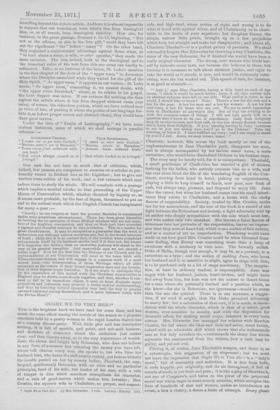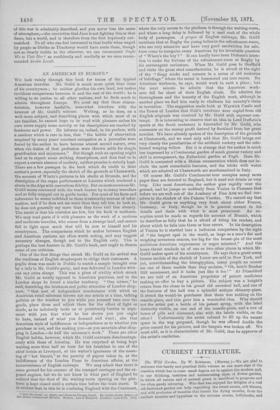OUGHT WE TO VISIT HER?*
Tills is the brightest book we have read for some thno, and has much the same effect among the novels of the season as a piquant anecdote told by a pretty woman in the rapid London dialect has at a country dinner-party. With little plot and less descriptive writing, it is full of sparkle, and point, and sub-acid humour, and sketches of character which the authoress just makes clear, and then throws away, as in the very wantonness of wealth. Jane, the clever and bright lady Bohemian, who does not believe in any form of accounts but counting the money you have loft, whose talk charms every man she speaks to, but who likes her husband best, who hates the stiff county society, yet feels so bitterly the insults passed on her by county ladies; Theobald, the easy, languid, gentlemanly Bohemian with no vices and no particular principles, fond of his wife, but fonder of his ease, with a vein of temper in him which somehow strengthens his character, and a vein of good-nature which makes him loveable ; Mrs. Crosbie, the squire's wife in Chalkshire, so proper, and respect- - * otigitt We 0 Vir0 liar ry Mrs. Edwardes. it vols. Londou : Bentley. Int.
able, and high-bred, whose notion of right and wrong is to do what is usual with squires' wives, and of Christianity to be chari- table to the faults of your superiors ; her daughter Emmy, the simple, narrow little prude, brought up on a few prejudices which keep her straight and make her disagreeable ; aud above all, Charlotte Theobald—it is a perfect gallery of portraits. We shall not readily forgive Mrs. Edwardoa for throwing away Charlotte, the sister of the easy Bohemian, for if finished she would have been a really original character. The strong, sour woman who binds her- self by imbecile social laws, not because she believes in them, but because it is nonsense to talk about abstract justice, and right to take the world as it stands, is new, and would be extremely inter- esting, were she but worked out. This speech of hers, for instance, is as good as almonds :—
"' And I,' says Miss Charlotte, laying a thin hand on each of her knees, think it would be much hotter, Anne, if all this useless talk. on abstract subjects wore left on one side. What justice is there in the- world, I should like to know ? None ! There's a law for the rich and a law for the poor. A law for men and a law for women. A law for the, well-born, a law for those who are not. We are as much hypocrites. here in Chalkshire as anywhere else. But all that has nothing to do- with the common-sense of things. I will not talk goody talk on a question that I know to be one of expediency. Lady Rose Golightly may do as she chooses, and float still, as she has always floated, because she is Lady Rose Golightly. If you,' turning harshly to Jane, 'continue to act as you are acting now, you'll go to the Dickens! Take my warning, or leave it. I have fulfilled my duty ; and I am ready to stand, by you if I (tan. Anne, we may return home.' "
Charlotte, however, flits across the book merely as one of the- unpleasautnesses in Jane Theobald's path, disappears too soon,. and is always accompanied by her feebler sister Anne, a mere caricature, who would have discredited Dickens in his feeblest days..
The story may be briefly told, for it is unimportant. Theobald, a small gentleman of Cbalkshire, has married a girl of sixteen, training for the ballet, who entirely contents him as a wife, and has ever since lived the life of the wandering English of the Con- tinent, moving from hotel to hotel, picking up acquaintances, playing a little to keep himself in funds, now poor, now flush of cash, but always easy, pleasant, and disposed to enjoy life. Jane likes the career, but when her husband comes into his small inheri- tance they return to Chalkshire, and a house with the choky flavour of respectability. Society, headed by Mrs. Crosbie, snubs. her for her antecedents, and the rest of the book is a record of the fight between the Bohemians and society, a fight admirably told by an author who deeply sympathizes with the side which must lose„ and who makes only two mistakes. She throws a faiut flavour of bitterness into her portraits of the respectables, leaves an impres- sion that they were at heart bad, which is as a matter of fact untrue, and as a matter of art an imperfection. Thackeray would have made us see how good Mrs. Crosbie could be when liberated from caste feeling, that Emmy was something more than a lump of sweetness with a tendency to turn sour. 'rho brutally selfish Duke of Malta, though true enough, it may be, as a portrait, is &- caricature as a type ; and the notion of making Jane, who loves her husband and is so sensitive to slight, agree to elope with him, is to be pardoned only as a bit of stage machinery. The tempta- tion, at least to ordinary readers, is imperceptible. Jane was. angry with her husband, jealous, heart-broken, and might have fled away from him, but hers was not the nature to desert home for a man whom she personally loathed and a position which, as. she know—for she is Bohemian, not ignoramus—would be worse than the one she quitted. There is in one sentence, a sugges- tion, if we read it aright, that the Duke promised ultimately to marry her; but a calculation of that sort, if it is made, is incon- sistent with the whole character, which is that of a sweet, good woman, over-sensitive to society, and with the disposition for dramatic effect, for making social coups, inherent in every born. actress. Mrs. Edwardes has managed her relation with Rawdom Crosbie, the lad whom she likes and fools and saves, much better, indeed with an admirable skill which shows that she understands. men as few lady novelists do, —understands the sharp line whicl. separates the sentimental from the vicious, how a man may be guilty, and yet not evil.
Flirting is, of course, Jane Theobald's weapon, and there is, as a catastrophe, this suggestion of an elopement ; but we must,
not leave the impression that Ought We to Visit Herf is a "lady's. novel," full of sensuality and seduction. It is free from both, it ends happily, yet originally, and its air throughout, if full of
sounds of strife, is yet fresh and pure ; it is like a play of Sheridan's, not one of Congreve's, and turns on the pivot of the perpetual social war which rages in some county societies, which occupies the lives of hundreds of men and women, makes an introduction an, event, a bow a victory, a dance a blaze of triumph. Every phase
of this war is admirably described, and you never lose the sense of atmosphere —the conviction that Jane is not fighting this or that dame, but a world, and is therefore from the first hopelessly out- matched. To all who can feel interested in that battle when waged by people as lifelike as Thackeray would have made them, though not so clearly visible to the observer, we can recommend Ought We to Visit Her ? as confidently and cordially as we once recom- mended Archie Lovell.



































 Previous page
Previous page